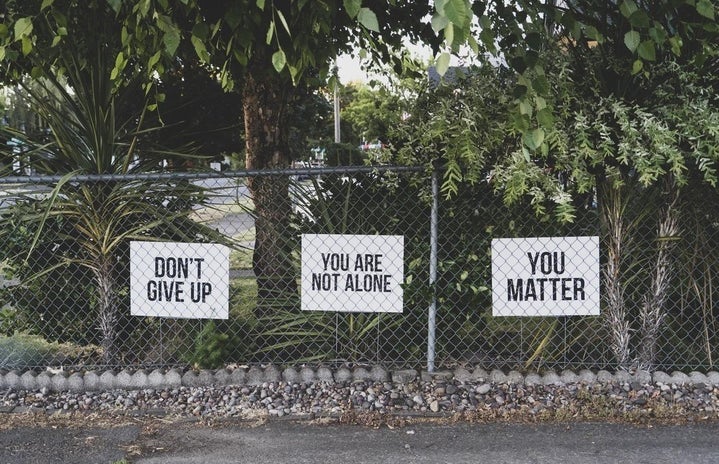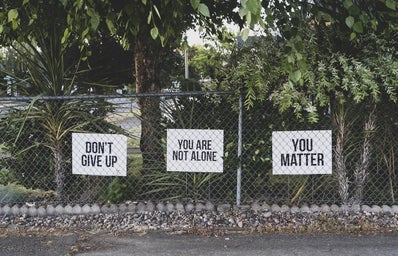It should come as a surprise to no one that since the onset of the pandemic, reports of increased mental health issues such as anxiety and depression have skyrocketed around the globe. The consequent health concerns, financial worries, and general sense of loss for a lifestyle once taken for granted are pervasive and at times seemingly all-consuming. Students in particular have experienced the fallout of this new pandemic world, with hundreds of thousands of young people scattered across the globe, isolated from their friends or families, trying to learn and engage through a computer screen, and challenged with avoiding human interaction at the exact phase of our lives when we are biologically programmed to crave each other’s company. With restrictions changing every five minutes, and the omnipresent threat of you or a loved one becoming sick, it is no wonder that people are struggling, especially if mental health maintenance was already a daily battle.
However, the unfortunate reality is that while it may be en vogue (and completely understandable) to be experiencing covid-related mental health issues, this has not been the case more generally for students, or indeed most people, pre-pandemic. Mental health still carries a tremendous stigma in the UK, and indeed around the world, a stigma which makes it all the more difficult for those who need help to seek it out. Pair this with the UK’s chronically understaffed and underfunded mental health resources, and you have yourself a perfect storm.
Enter B&Together, a new student organization that now spans several universities across the UK, designed to raise funds and awareness for student mental health. I had the opportunity to sit down with founder and CEO Xavy Bull and social media coordinator Flora Edmiston to learn a little more about the project, it’s genesis, and their goals for the future.
First, they had to set me straight on the timeline. Contrary to my initial supposition that it was a quarantine passion project, B&Together had its inception a year ago in November of 2019. Xavy tells me that he was “just lying in bed, thinking about what I could do to make a difference to help with mental health,” when the idea for B&Together came to him.
The original concept for the project was quite different from its current form. Initially, the plan was to sell the wristbands for university events such as balls at a slight markup, with the profits going to mental health organizations – “a really gimmicky way of making money for charity,” Xavy describes.
But then covid hit, and, as with every facet of our lives, plans changed. Forced to rethink the concept for the organization, and faced with the uncertainty of university life and the loss of several universities’ involvement, the team had to reconceive the contribution they were hoping to make. “Fundraising is actually now our back burner project whilst we focus on trying to promote connections and awareness,” Xavy says.
But it is this element of interconnectivity that, as far as I’m concerned, makes B&Together special. If you explore their website, you will discover a blog page entitled “Awareness,” where students can share their stories of mental health struggles. Another section entitled “Connect” helps connect students with mental health resources specified by university, as well as a comprehensive list of national resources. Indeed, the entire website seems designed with the specific goal of making visitors feel less alone. Be it through reading a story from a fellow student with whom they might relate, or putting them in touch with a much needed advisor or counselor, the B&Together site helps bring people a little closer in a time when we feel further apart than ever before.
I next asked what purpose they hoped B&Together would serve in the St Andrews community specifically. Xavy was quick to emphasize the fact that “it’s very difficult when you’re up here to find services beyond Student Services,” who will most commonly address student mental health concerns by asking if they want to take a year out. “That’s not what people want,” says Xavy.
Xavy and Flora were both very diplomatic when speaking about the extant St Andrews mental health resources, but the general consensus was that the University simply does not have the resources it requires to properly care for all the students in need, a pattern that is reflected around the country. “We need more highly trained psychologists in this country,” Xavy stresses. “Scotland is woefully underfunded when it comes to mental health services.” Unfortunately, so is St Andrews. When it comes to the services available to students in distress, “there’s definitely improvement to be done,” Xavy believes. That’s where he’s hoping B&Together can help.
I next asked the pair to answer a more complicated question: “To what extent do you believe stigmas around mental health are gendered?”
“You’ve got to be careful with how you address this,” Xavy says. “Our culture has always promoted this sort of ‘stiff upper lip’ culture, for men especially. I know it’s something I’ve been combatting myself.” I mentioned the Movember campaign and its mission to destigmatize and raise awareness for men’s mental health specifically, which Flora agreed was founded to combat exactly this problem – the hairy upper lip ideally overiding the stiff one. But it is not only men’s mental health that carries a heavy stigma. Xavy points out the oft-hurled accusation that women suffering from eating disorders are somehow “performative” or “attention seeking,” assertions that are not only harmful but extremely dangerous, making it harder for those struggling to seek out help. The pair agreed that while certain mental health issues come with societally enforced gendered stigmas, these need to be contested and dismantled as much as possible. When it comes to your mental wellbeing, they asserted, your gender identification simply should not matter.
Finally, I asked Xavy about his long term goals for B&Together, and as it turns out, this post-covid model of the organization seems to be the one they’d like to stick with, with the emphasis placed on raising awareness and destigmatizing mental health. “Trying to reach every university would be the best goal we can do right now,” Xavy tells me. This is not to say that they have completely abandoned their original idea of selling wristbands for events, but the bands would now serve more than just a financial purpose. “Events are such a regular part of uni life. If we’re just making a mental health brand a regular part of uni life by linking up with those events, that’s what we want to do.”
There is much that differentiates B&Together from other mental health organizations. Perhaps my favorite piece, as an aspiring artist myself, is the effort to tie in student artists to the project, selling t-shirts featuring the work of other students to both raise money for mental health charities, and promote aspiring artists into the bargain. “I want to try and promote more than just mental health,” says Xavy. “If I can help student artists be at the forefront, why not do that as well?” (Excellent.)
It is exactly this sense of comradery and support, this effort to bring together so many students from different backgrounds and different universities, that makes B&Together unique. It’s not just about fundraising or destigmatizing. It’s about community, about lifting each other up, supporting one another, and, as the organization title cleverly suggests with its double entendre, being together (take out the & and you’ll see what I mean). And in a world increasingly divided by political ferment and wealth disparity, scrutinized and competicized by social media, and above all increasingly isolated by the continuing pandemic, we could all stand to “be together” a little more.
So, to make a long story short, check in on your friends, tell your loved ones you care, reach out to your struggling neighbor, and check out the fantastic work being done by B&Together. There is always more we can do.


